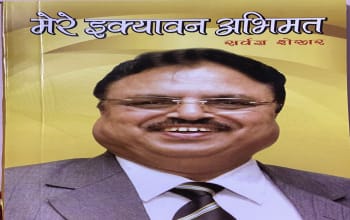सप्ताहांत: ऑनलाइन शिक्षा व बच्चों में संस्कारों का हनन

कोरोना, भारत-चीन सीमा विवाद, विकास दुबे और राजस्थान में राजनीतिक उठापटक के बीच हम एक ऐसे विषय को भूल गए जो इस समय बहुत प्रासंगिक है। वह है बच्चों में नीति व सांस्कृतिक संस्कारों का पोषण। लॉक डाउन की वजह से व बाद में अनलॉक डाउन के समय में भी छोटे बच्चों को एवं बड़े विद्यार्थियों को भी ऑनलाइन शिक्षा दी जा रही है। ऑनलाइन शिक्षा का जितना लाभ है उससे ज्यादा उसके दुर्गुण भी हैं। ऑनलाइन शिक्षा के लिए बच्चों को मोबाइल, कंप्यूटर, लैपटॉप, आईपैड आदि का सहारा लेना पड़ता है और उसकी वजह से वह जो कुछ सीखता है उसके अलावा वह भी सीखता है जो उसे नहीं सीखना चाहिए। आज हमारा सप्ताहांत इसी विषय पर है।
क्या हम अनुशासित, नीतिवान पीढी का सृजन कर रहे हैं? आज का यह विषय अत्यंत सामयिक और प्रासंगिक तो है ही, वर्तमान स्थिति में जो भारतीय संस्कृति का क्षरण हो रहा है एवं माता-पिता व बच्चों के बीच में जो दूरियां बढ़ रही हैं उनको भी रेखांकित करने का एक प्रयास है। हमें यह देखना है कि जो संस्कार हमारे माता-पिता ने हमारे अंदर रोपित किए, क्या वही संस्कार हम अपने बच्चों में प्रवेश करा पा रहे हैं या नहीं।
एक श्रेष्ठ पुरुष में ये 8 गुण अपेक्षित होते हैं:
अष्टौ गुणा पुरुषं दीपयंति, प्रज्ञा सुशीलत्वदमौ श्रुतं च।
पराक्रमश्चबहुभाषिता च, दानं यथाशक्ति कृतज्ञता च॥
भावार्थ: आठ गुण पुरुष को सुशोभित करते हैं – बुद्धि, सुन्दर चरित्र, आत्म-नियंत्रण, शास्त्र-अध्ययन, साहस, मितभाषिता, यथाशक्ति दान और कृतज्ञता॥
इस संबंध में मुझे एक संस्मरण याद आता है। मेरे घर पर सत्यनारायण भगवान की कथा हुई। जिसमें वृद्ध पंडित जी आए। कथा समाप्त होने के बाद उन्होंने मुझसे कहा, बेटा जब मैं आया तो तुम दरवाजे पर खड़े थे, न भी खड़े मिलते तो मैं कॉल बैल बजा कर आपको बुला लेता और आ जाता। फिर जब मैं अंदर आया तो आपने और आपके पूरे परिवार ने मेरे चरण स्पर्श किए, आप न भी करते तो मैं क्या कर लेता, फिर आपने मेरे से जल पीने को पूछा, आप न भी पूछते तो मुझे प्यास लगती तो मैं मांग लेता। यह बहुत अच्छे संस्कार हैं ।
मैं खुश हुआ पर पंडित जी बोले लेकिन बेटा तुझे खुश होने की आवश्यकता नहीं है। यह संस्कार तो तुम्हारे पिताजी ने दिए हैं। मैं तुम्हारी नहीं, तुम्हारे पिताजी की तारीफ कर रहा हूं कि वह कितने अच्छे थे, उन्होंने तुम्हारे अंदर इतनी अच्छे संस्कार, भारतीय संस्कृति की नीतियों को रोपित किया है। क्या तुम भी अपने बच्चों में ऐसा ही कर रहे हो? यह तुम देखना और अगली बार जब मैं तुम्हारे बेटे के यहाँ कथा करने आऊंगा तब मैं तुमको बताऊंगा।
पंडित जी का यह आकलन बिल्कुल सही था और यह हमेशा मुझे याद रहता है। मैं मानता हूं कि मेरे माता पिता और मेरे माता-पिता के माता-पिता के बीच में केवल एक पीढ़ी का अंतर था लेकिन मेरे और मेरे बच्चों के बीच में कम से कम 4 पीढ़ी का अंतर है क्योंकि सुविधाओं में चार गुना वृद्धि व सुधार हुआ है। बाजारीकरण व वैश्वीकरण ने संबंधों को ढहने पर मजबूर कर दिया है। पहले हमको छोटी-छोटी शिक्षा दी जाती थी कि बड़ों की तरफ पैर करके नहीं बैठना है, कभी बड़ों के सिरहाने नहीं बैठना है पैरों की ओर ही बैठना है, नमस्कार दोनों हाथ जोड़कर करना है। बड़ों के सामने हंसी मजाक नहीं करना है, आदि आदि। माता-पिता व बड़ों नित्यप्रति चरण स्पर्श करना है।
प्रातः काल उठ के रघुनाथा
मात पिता गुरु नावहिं माथा।
फिर पूजा पूजा पाठ करनी है, रामचरितमानस, हनुमान चालीसा का पाठ करना है, शाम को घर के मंदिर में दीपक जलाना है। गुरु जी को माता-पिता बच्चे को सौंप देते थे और कहते थे आज से यह आपका बच्चा हुआ, आप चाहे जैसे इस को ठोक पीटकर सही कर देना। लेकिन आज उल्टा है। यदि शिक्षक विद्यार्थी से जरा भी कुछ कह दे तो तुरंत FIR हो जाती है।
मोबाइल, इंटरनेट, फेसबुक की वजह से भी बच्चों में माता-पिता वह संस्कार निरूपित नहीं कर पा रहे जो होना चाहिए क्योंकि वह जो भी कहते हैं वह अपने मोबाइल में लैपटॉप में व्यस्त हो जाते हैं। विद्यालयों में भी यही स्थिति है कि शिक्षक भी अपने मोबाइल में व्यस्त रहते हैं और वह केवल उतना पढ़ाते हैं जितना कि उनको पढ़ाना सिलेबस में आवश्यक है। संस्कृति का ज्ञान तो कोई भी नहीं दे रहा। ऐसे में जिम्मेदारी माता-पिता की हो जाती है कि बच्चे के हाव भाव में परिवर्तन पर पूरा ध्यान रखें। बच्चा कहाँ जा रहा है, कितने बजे लौट रहा है, देर से आ रहा है तो क्या कारण है, उसे विद्यालय में या विद्यालय के बाहर या परिवार के किसी सदस्य से कोई परेशानी तो नहीं है?
एक सुझाव और मैं देना चाहूंगा कि शाम का खाना सब को एक साथ मिलकर बैठकर खाना चाहिए तभी ज्ञात हो सकता है कि बेटा खाना कम खा रहा है या ज्यादा खा रहा है। कम खा रहा है तो क्यों खा रहा है, उसे कोई परेशानी तो नहीं है, ज्यादा खा रहा है तो उसको कोई बीमारी तो नहीं है। वह खाना खाते में आपसे किस तरह की बात कर रहा है, कैसा व्यवहार कर रहा है, यह आपको एक ही बार में ज्ञात हो जाता है। इसी दौरान बच्चों को अपने पिता जी, दादा जी के गुणों के बारे में चर्चा कर सकते हैं।
इसके अतिरिक्त दिन में कम से कम एक घंटे बच्चों को धार्मिक एवं सांस्कृतिक सद्भाव वाली पुस्तकें व समाचार पत्र पढ़ने को अवश्य कहना चाहिए और यह सब कार्य अपनी निगरानी में कराया जाना चाहिए।
निष्कर्षतः हम कह सकते हैं कि हम चाहते तो हैं कि बच्चों को नीतिवान बनाया जाए, संस्कारी बनाया जाए, उनको गुणों की खान बनाया जाए। लेकिन ऐसा प्रतीत होता है कि हम अपने प्रयास में शत-प्रतिशत नहीं, कुछ प्रतिशत ही सफल हो पा रहे हैं। अपने प्रयासों में और कुशाग्रता लाने की और सुधार लाने की आवश्यकता है। इसमें दोष बच्चों का नहीं बल्कि बच्चों के माता-पिता का ही है यदि बच्चे संस्कारित नहीं हो पाते हैं, यह उत्तरदायित्व उन्हीं का है।
– सर्वज्ञ शेखर
स्वतंत्र लेखक व साहित्यकार
Read in English
Online Education and Lack of Children’s Enculturation
Between Corona, the Indo-China border dispute, Vikas Dubey and the political upsurge in Rajasthan, we have forgotten a topic that is very relevant at the moment. It is the policy of children and nurturing cultural values Due to lock down and later in the time of unlock down, online education is being imparted to younger children and also to older students. The benefits of online education are more than its perils. For online education, children have to resort to mobiles, computers, laptops, iPads etc. and because of that, they also learn what they learn and what they should not learn. Today is our weekend on this topic.
Are we creating a disciplined, ethical generation? Today’s topic is very timely and relevant, in the current situation, there is an attempt to highlight the erosion of Indian culture and the distance between parents and children. We have to see whether the rites that our parents have planted in us, whether we are able to get our children to enter them or not.
These 8 qualities are required in a superior man: Intelligence, beautiful character, self-control, scripture study, courage, frugality, in-form donations and gratitude.
I remember a memoir in this regard. The story of Lord Satyanarayan happened at my house. In which old Panditji came. After the story was over, he said to me, “Son, when I came, you were standing at the door, nor would I have stood, I would have called you by calling the bull and coming.” Then when I came in, you and your whole family touched my feet, what would I do if you did not do it, then you asked me to drink water, if you did not ask, I would feel thirsty. These are very good values.
I was happy but Panditji said, but son, you do not need to be happy. Your father has given this rite. I am not praising you, not your father, for how good he was, he has planted such good values in you, the policies of Indian culture. Are you doing the same in your children? You will see this and next time I come to narrate with your son then I will tell you.
This assessment of Panditji was absolutely correct and I always remember it. I agree that there was only one generation gap between my parents and my parents’ parents, but there is at least a 4th generation difference between me and my children as the facilities have increased and improved fourfold. is. Marketization and globalization have forced relations to collapse. Earlier we were given a small education that we do not have to sit on the feet towards the elders, never have to sit at the head of the elders, have to sit on the feet, the salutation is to be done with both hands folded. Do not joke in front of elders, etc. Parents and elders have to touch the feet every day.
Then you have to recite the Puja Pooja, recite Ramcharitmanas, Hanuman Chalisa, light the lamp in the temple of the house in the evening. The parents used to hand over the child to the Guru and said that from today onwards it was your child, whichever way you like, you can correct it by beating and beating it. But today it is the opposite. If the teacher says anything to the student, then the FIR is immediately made.
Because of mobile, internet, Facebook, even in children, parents are not able to represent the rites that they should have because whatever they say they get busy on their mobiles in laptops. This is also the situation in schools that teachers are busy with their mobiles and they only teach as much as they are required in the syllabus. Nobody is giving knowledge of culture. In such a situation, it becomes the responsibility of the parents to take full care of the changes in the gesture of the child. Where is the child going, at what time is he returning, if he is coming late, what is the reason, he has no problem in school or outside school or any family member?
One suggestion and I would like to give is that everyone should eat the evening meal together and only then it can be known that the son is eating less or eating more. If he is eating less then why is he eating, he has no problem, if he is eating more then he does not have any disease. What kind of food he is talking to you in the food, how is he behaving, it becomes known to you at once. During this time, children can discuss about the qualities of their father, grandfather.
In addition, at least one hour a day children must read books and newspapers with religious and cultural harmony and all this work should be done under their supervision.
In conclusion, we can say that we want children to be made ethical, cultured, they should be made mine of quality. But it seems that we are able to succeed in our efforts, not 100 percent. There is a need to further improve our efforts. The fault lies not with the children but the parents of the children, if the children are unable to be cremated, it is their responsibility.
– Sarwagya Shekhar



